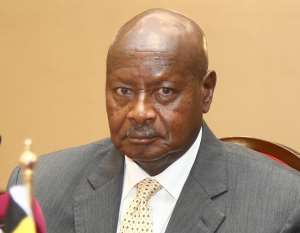
President Museveni explains the ‘people-power’ phenomenon in terms of recent victories of the ruling National Resistance Movement(NRM) in village council elections. The landslide wins according to him, were inspired by governance gains in the education, health and security sectors. This is not political rhetoric; it is statistical reality—with literacy rates of youth aged 15 to 24 hitting 87% by 2015, only 21 of the 1,000 live child births die before age five (compared to 47 in 2012) and a projected very positive economic outlook by 2024 when core infrastructure projects like Karuma power dam are operational—necessitating less or very limited more foreign debt acquisitions.
Yet, despite so, the rate of people-power enigma continues to boggle the mind. Characteristically, the wave is amorphous, structure-less, leader-less, shape-less but purposeful. Its irrational but national. It targets not the nation but particular nationals. Not ideologies but particular ideologues.
Across Africa, related waves have swept and still rage throughout the continent in various shapes. They are traced more than a decade ago in Nairobi, Kenya. Mwai Kibaki, a prominent nationalist of independent Kenya, had become a dominant ideologue of the Kanu party’s ideology that lasted for 44 years. A major violent wave ensued after his bizarre-night swearing-in, following a highly –charged election of 2007. It claimed over 1,000 civilian deaths, destroyed property and broke down vital infrastructure. It drew in direct foreign intervention, causing a unity government of Mwai and Raila Odinga. Noteworthy, both men represented the old Kanu philosophy but were separated by one’s attempts for absolute domination. Hence the Kenyan uprising sought to challenge that dominion.
From East Africa, the wave surged north of the continent four years later in 2011/12. Col Muammar Qaddafi, the sole ideologue of Libya fell-off alone with just a few aides. Majority of his compatriots are still active in the turbulent Libyan politics. In Egypt, it only swept off Hosni Mubarak. His close ally and top military commander, Fatah al-Sis has twice won the popular election votes this decade.
In West Africa, the wave is being effectively managed by the regional military of Ecomog, often to the citizens’ desire.
In the Central and South African region, it is managed through internally generated reforms by ruling establishments—often off-loading incumbents. Cases include South Africa’s ANC with Mbeki and Zuma being prominent victims; Zimbabwe’s Zanu-pf that forcefully retired Robert Mugabe in a diplomatic coup. Tanzania that has had one ideology of Chama Cha Mapinduzi has had five ideologues with different approaches to social-economic challenges—Nyerere, Mwinyi, Mkapa, Kikwete and the incumbent Magufuli. Although in Ethiopia, the internal reforms are still shaky, the ruling party is not shy to retire an incumbent mid-way the current term.
The integration of opposition groups into governance structures of the ruling party has been ruptured by suspicions of undermining the official public pledge (manifesto) and often only favoring the political elite at the cost of citizens. Integration processes that have previously only offered temporary relief include of Mwai and Kibaki (Kenya), Mugabe and Tsvangirai (Zimbabwe), Kiir and Machar (South Sudan) and Bashir and JEM (Sudan).
Therefore, lensed from a continental perspective, the Ugandan people-power wave can either be dismissed at our own risk or embraced with grace. Being irrational in nature makes it inevitable to strike anytime when least expected despite preparations.
Sheer dismissal of it invites for one of the four, but potentially risky models as experienced elsewhere: (i) Major violence as in Kenya, Tunisia, Egypt and Libya). (ii) Regional military intervention (Ivory Coast and Gambia), (iii) Internal reforms targeting the incumbent (South Africa, Zimbabwe, Tanzania and Ethiopia) or (iv) Integration of opposition forces in official policy programs, (Kenya, Zimbabwe, Sudan and South Sudan).
Ultimately, Ugandans, like their African peers are purposely thinking one thing: governance policies that deliver not only promise jobs; for a decent world citizen of this century. Kampala, luckily has some ample time to make a choice.
Swaib K Nsereko
Lecturer Mass Communication Department, Islamic University in Uganda/ National Coordinator, Moral Reform Movement (MRM)




 April 20: Cedi sells at GHS13.63 to $1, GHS13.06 on BoG interbank
April 20: Cedi sells at GHS13.63 to $1, GHS13.06 on BoG interbank
 Dumsor: I'm very disappointed in you for messing up the energy sector — Kofi Asa...
Dumsor: I'm very disappointed in you for messing up the energy sector — Kofi Asa...
 Dumsor: Instruct ECG MD to issue timetable and fire him for lying — Kofi Asare t...
Dumsor: Instruct ECG MD to issue timetable and fire him for lying — Kofi Asare t...
 Ashanti region: Road Minister cuts sod for 24km Pakyi No.2 to Antoakrom road con...
Ashanti region: Road Minister cuts sod for 24km Pakyi No.2 to Antoakrom road con...
 Train crash: ‘How could any normal person leave a car on rail tracks?’ — Frankli...
Train crash: ‘How could any normal person leave a car on rail tracks?’ — Frankli...
 Train crash: Driver of abandoned vehicle not our branch chairman nor secretary —...
Train crash: Driver of abandoned vehicle not our branch chairman nor secretary —...
 Kenya pays military homage to army chief killed in copter crash
Kenya pays military homage to army chief killed in copter crash
 US agrees to pull troops from key drone host Niger: officials
US agrees to pull troops from key drone host Niger: officials
 Mahama vows to scrap teacher licensure exams, review Free SHS policy
Mahama vows to scrap teacher licensure exams, review Free SHS policy
 Government will replace burnt Madina shops with a new three-story, 120-store fac...
Government will replace burnt Madina shops with a new three-story, 120-store fac...
